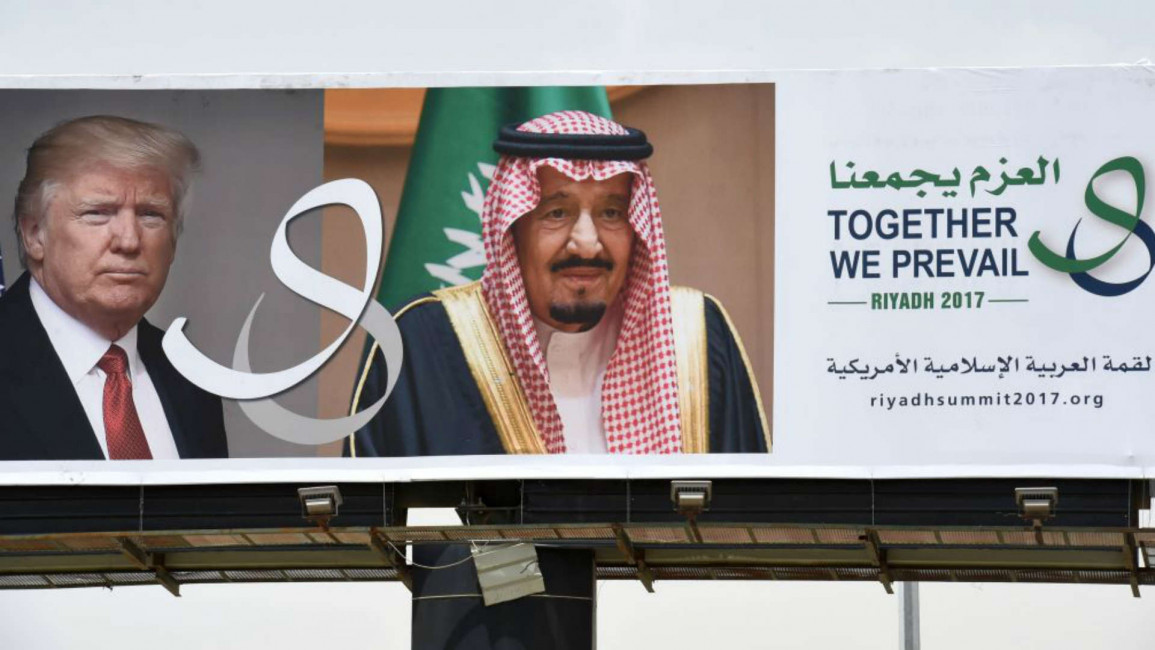
Facing domestic turmoil, Trump seeks TLC from Gulf allies
Traditionally, newly inaugurated US presidents make their first overseas trip to either Mexico or Canada. But, true to style, Trump's decision to make his first foreign visit to Saudi Arabia is a clear attempt to set himself apart, emphasising his country's new foreign policy, and leadership on the world stage.
Arriving in Riyadh later today, Trump wants to tell the world that the American leadership is back - the US will stand by its allies, and his America First policy will not undermine his role abroad. He also wants to emphasise good relations with the Muslim world after initial controversy over his toxic travel ban, and Islamophobic rhetoric during the presidential campaign.
Actually, both American and Saudi officials are doing their best to highlight the significance of the trip and make it a success.
In addition to stressing American leadership, Trump will be looking to use the trip to improve his image at home. After endless crises since taking office, including the most recent controversy over firing of the FBI director and sharing intelligence with Russian officials, Trump is in desperate need of some positive media attention.
By visiting Saudi Arabia and Israel, Trump is hoping to cash in on a warm reception from him allies, and a welcome worthy of the leader of a global superpower. He will be aiming to cast himself as a man of peace, capable of addressing and defusing tension between some of the world's greatest civilizations and religions.
 |
Trump will be looking to use the trip to improve his image at home |  |
Trump also wants to appear a man of diplomacy and resolve, restoring America's alliances against staunch enemies, such as Islamic State (IS) and Iran. Saudi Arabia, on the other hand, sees the trip and the planned GCC and Muslim summits as an important opportunity to emphasise both its pivotal role in Trump's new strategy, and in the Arab and Muslim worlds.
Saudi Arabia is also keen on garnering American support on major issues such curtailing Iran, ending the war in Yemen, ending the Syrian crisis, and "stabilising" the Middle East after what it views as the upheaval of the Arab Spring. It is widely expected that Trump and Saudi leaders will sign major economic and military agreements worth tens of billions of dollars during the trip in order to solidify new relations.
| Read more: Trump should know: Bibi won't budge | |
Yet, despite such a strongly shared interest in making the trip a success, many in the US and the Arab world are wary it also has the potential to backfire, mostly because of how Trump himself has handled US foreign policy thus far.
First, the trip is taking place at an inconvenient time for Trump. He is seen as a weak and troubled leader - widely criticised by his own people, media, and party leaders for his endless and clumsy mishaps. Hardly a week has passed since Trump took office without him getting involved in a new political crisis.
 |
By visiting Saudi Arabia and Israel, Trump is hoping to cash in on a warm reception from him allies |  |
Tump's travel ban, the firing of National Security advisor Michael Flynn, his administration's controversial ties to Russia, are just few examples. Many in the US and around the world are already wondering if he will make it to the end of his first term.
The international wave of populism that carried Trump to office also appears to be retreating. Recent defeats for populists in The Netherlands, France, and Germany, have left us wondering if Trump has already served his purpose as an (albeit loud) alarm bell, and is now simply defunct and irrelevant.
Second, the trip lacks the positive media and popular attention that Obama's Cairo speech won. Obama, who has received plenty of criticism for his inaction on Syria, among other issues, spoke to the Muslim peoples - not rulers - from Cairo University, emphasising shared values and aspirations for the future. He was a young and popular president carrying a message of hope.
 |
Trump favours closed doors diplomacy and hard economic and political interests |  |
In contrast, Trump favours closed doors diplomacy and hard economic and political interests. He is seen as a populist figure who rose to power using xenophobia and Islamophobic rhetoric. He is also seen as a controversial president, disliked by a growing number of his own people and masses around the world.
Trump, during his upcoming trip to the Middle East, will not be speaking to or received by the public, depriving him of significant popular and media momentum.
Third, Trump's overemphasis on hard economic and political interests, and a shocking disregard for values when dealing with the Arab and Muslim regimes, undermines his policies which are seen as temporary, and lacking the moral foundations to last.
As many Arab counties are still dealing with the aftermath of the Arab Spring, the failed revolutions, and the rise of counter revolutions, Trump's foreign policy - favouring domestic only interests - is seen as fatally flawed. The US is once again portrayed as a selfish empire, caring only for a bigger share of economic wealth and strategic hegemony.
Fourth, Trump himself is seen as a major threat to the upcoming trip. He will be speaking on Islam and "terrorism". His first tweets from abroad as president are a potential minefield, given the many cultural and political sensitivities he is likely to encounter. Trump's impulsive nature and arrogant self-assured attitude will be worrisome to many, not least those in his own media team.
 |
Trump's impulsive nature and arrogant self-assured attitude will be worrisome to many, not least those in his own media team |  |
Finally, for the last four months, Trump has employed strong rhetoric on Iran, Syria, and IS among other issues. He promised to help strike a historical peace deal between the Israelis and Palestinians. He has also promised to rebuild US alliances in the region.
But beyond rhetoric and lofty ambitions, it is not clear that he has so far achieved anything more than much hot air. Worse, it's even hard to tell if he has any clear policies, or the intention to follow up his promises.
The problems facing the Middle East are serious, complex, and inter-connected. It is, for example, impossible to pressure Iran without upsetting America's allies in Iraq. The US cannot ask Saudi Arabia to step up the fight against IS, without seeking to free some Saudi resources consumed by the war in Yemen, by solving the growing political and humanitarian crisis there.
The US cannot make any progress in dealing with Iran, Syria, and Yemen without addressing Russia's growing and future role and influence in the region. The Palestinian-Israeli conflict is another set of complex and inter-connected internal and regional issues.
In summary, the Trump administration needs to develop a serious strategy if it really wants to engage its Arab allies. Many might then wonder what Trump might achieve during his trip to Saudi Arabia, beyond warm diplomacy with allies, tough rhetoric on adversaries, and signing some lucrative economic and arms deals before moving on to his next destination. And they'd be right to do so.
Alaa Bayoumi is an Egyptian journalist and the author of two books studying US foreign policy in the Middle East. He also writes on democratic transition in the Arab world.
Follow him on Twitter: @Alaabayoumi
Opinions expressed in this article remain those of the author and do not necessarily represent those of The New Arab, its editorial board or staff.




